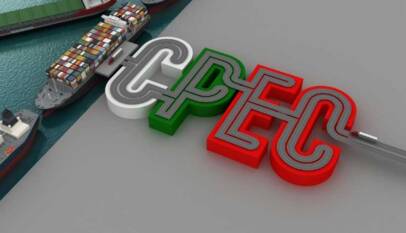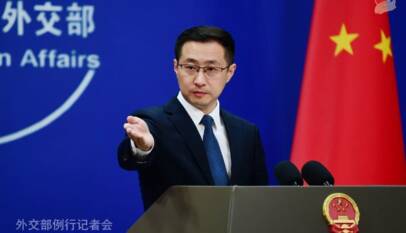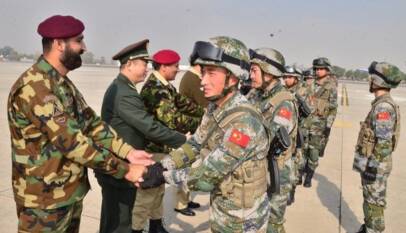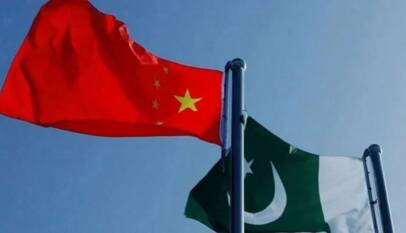CPEC continues to progress towards development and prosperity despite COVID-19
In the face of adverse circumstances amid the outbreak of COVID-19, the China Pakistan Economic Corridor is still progressing and contributing to the socio-economic development of Pakistan. It is because of the true commitment between Pakistan and China that the project is making progress despite the suppositions of halt amid Covid-19. China’s unprecedented victory in fight against COVID-19 has paved the way for the smooth continuation of CPEC. The establishment of CPEC Development Authority and Army looking after its security has ensured the smooth execution of CPEC. The novel coronavirus has so far the least impact on the project and the focus stands still on the timely completion of the project.
Strategic relationships at international level are always based on mutual interests with no permanent friends/adversaries and are developed and manipulated by stronger states, like a chess game, using smaller or weaker states as the chess pieces. The weaker states are manipulated through hijacked political systems, buying out the influencers and targeting their centres of gravity, forcing them to be part of their international strategic game plan.
In our part of the world, China undoubtedly, leads the race and fast approaching to international dominance, making big economic inroads throughout the globe. Seriously worried, the US is making its all-out effort to contain China and pumping India to take on the role of a serious contender for the regional leadership. Pakistan with its important geo-political stature, nuclear capability and very professional/strong defence forces, is an obvious eye-catcher and is being closely monitored by the vested interests to keep it manageable in size and strength. The special strategic plan envisages use of its hostile neighbours and some elements within the country, to facilitate their plans, in return of political/monetary gains. Unfortunately, some religious groups are also on board. Pakistan Army, being the centre of gravity, remains the main target.
Pakistan-China strategic partnership, based on mutual interests, has stood up to all the tests of the times. China-Pakistan Economic Corridor (CPEC), the biggest joint venture, is a collection of infrastructures being built to enhance the geographical linkages connecting China’s Xinjiang to Arabian Sea, through Pakistan, giving it a way out to the sea at Gwadar, for their trade with the Far East and the West. Besides China and Pakistan, the project will also have positive impact on Iran, Afghanistan, Central Asian Republics and even India. Improved road, rail and air transport systems with free exchanges of growth/people to people contact, enhanced understanding through academic, cultural and regional knowledge and smooth flow of trade and businesses through a win-win model is likely to result in a well-connected integrated region of shared destiny, harmony and development.
For Pakistan, CPEC is intended to rapidly upgrade the required infrastructure and strengthen its economy by construction of modern transport network, numerous energy projects and Special Economic Zones. Despite all the resistance from the adversaries, construction is successfully on its way to a timely completion.
Resistance and criticism of the CPEC by the US and its allies is quite understandable. However, their policy of a stick and carrot through continuous warnings to Pakistan on the project, facilitating/encouraging anti-state nationalist elements for their anti-CPEC rhetoric at home and abroad and offering new business opportunities to Pakistan, have not made any impact on the project.
While, China has strongly rebuffed criticism of CPEC projects, Pakistan too, has rejected pressure to question Chinese on debt servicing, accountability, fairness and transparency in the project. India, which has no direct relevance to the project except that it passes through Kashmir and will boost Pakistan’s economy, has also been actively involved in attempts to sabotage it. A chain of under-cover Indian Consulates established all along Pak- Afghan and Pak-Iran borders to closely monitor the project and sponsor sabotage/ insurgency operations in Baluchistan, is an open secret. Unfortunately, both the host governments in this case have provided Indians with this facility without any diplomatic justification. Interestingly, some of these Consulates with 50(+) staff members (99% undercover RAW operatives) have been established at places where there are not even 50 Indian families residing to enjoy their consular services. India had its own interest in developing seaport at Chabahar to provide a link to Arabian Sea via Afghanistan and Iran. However, the ambition seems to have turned into a by-gone desire.
COVID-19 pandemic has posed a wide- ranging negative consequences throughout the globe and the post-pandemic era is likely to witness formidable changes amongst various political, economic and social structures. Economies are likely to be the major casualties. The situation predicts a scenario with changed strategies, reshaped alliances and new economic priorities.
Despite their own crumbled economies, the anti- CPEC forces are likely to continue pressure on Pakistan’s fragile economy to dilute our efforts on the project. Increased military pressure on both eastern and western borders, renewed support to insurgents in Baluchistan and indoctrination in Gilgit-Baltistan are likely to be the major ingredients of the new anti-CPEC offensive. Efforts to create religious disharmony and political instability will be more visible in the coming days.
On the positive side, we see China firmer on the project and in a much better position to cope with the COVD-19 aftermath than any of its adversaries. Iran too seems to have changed its perspective towards the regional politics and relations with Pakistan. Despite their tough resistance to CPEC, US stance towards Pakistan also seems to be getting to a new normal, especially in view of their planned extrication from Afghanistan.
Internally, it is encouraging to see Pakistan more stabilised under new governance system. The set-up of NCOC (National Command and Operations Centre) with active participation by the army’s high brass, to handle Corona pandemic is a fair display of how things are being processed and handled. Establishment of CPEC Development Authority and Army looking after its security are the re-assuring aspects of the project. While the grey areas mentioned above need to be taken care of, we can see a positive impact of the aftermath of COVID-19, on timely and successful completion of the project CPEC.
Chinese Ambassador highlights significance of Third Plenary Session for China-Pakistan cooperation
The Third Plenary Session of the 20th Central Committee of the Communist Party of China ha…












